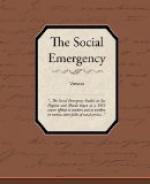The adolescent boy is the hope of our race. He is the man in the making. Whether he is to be a constructive force, a nonentity, or a destructive force depends largely on influences during this period. In adolescence the processes of destruction are quick and sudden. Statistics of reformatories and prisons show that either crime itself or the moral breakdown which leads to crime begins in boyhood. A study of the lives of great constructive characters shows that their success was largely determined by influences during this period. Certainly, there is no more important task for our nation than the training of our boys.
Adolescence begins at puberty, the transition period during which the sex functions come into full prominence. Its beginning is marked by great physical changes. There are also mental and psychic changes. This fuller development of sex means for the youth new power, new emotion, new capacities for enjoyment of life. At this time the will should emerge as an asset of character. The boy now desires more knowledge of the new world in which he finds himself. He wants to see it by day and by night. He wants to be physically active, or entertained. He belongs to some sort of gang and is loyal to it. His is an age of hero worship.
If the knowledge and the entertainment he finds is wholesome, if the gang is a good one, if the hero is a noble character, if, with emotion and new powers, there is also a strong will, all goes well. But if these influences are not helpful and the will is weak, the result may be quickly disastrous.[41]
Inquiry into the lives of any considerable number of adolescent boys leads one to believe that there exists what almost might be called a conspiracy of silence, misinformation, and bad influence against most boys of this age. Parents for the most part either evade or answer untruthfully the questions of their six-, seven-, and eight-year-old boys regarding birth and reproduction. From this time on, nearly all boys receive many false and low ideas regarding sex, marriage, and the relationship between men and women.
After the stork story, there come incorrect versions of reproduction from boy companions. Then come notes at school, picture cards, comic weeklies, quack advertisements, and unwholesome vaudeville acts. These destructive influences come, for the most part, entirely unsolicited, in response to a normal desire for knowledge and clean entertainment. Boys seldom go to their first shows to see what is vulgar or sensual. They go for clean fun, gymnastics, magicians, and other legitimate amusements. The unwholesome features are thrust upon them.
As a result of these influences on the impressionable mind of the growing boy, he comes to regard sex as low and vile instead of sacred. He acquires a vulgar vocabulary which he necessarily uses in his thinking and sometimes in his conversation. The silence and evasive answers of adults withhold healthful knowledge and increase curiosity. Curiosity often leads to investigation, which often results disastrously.




